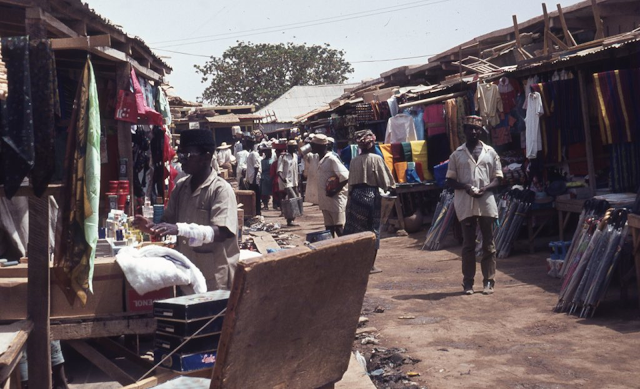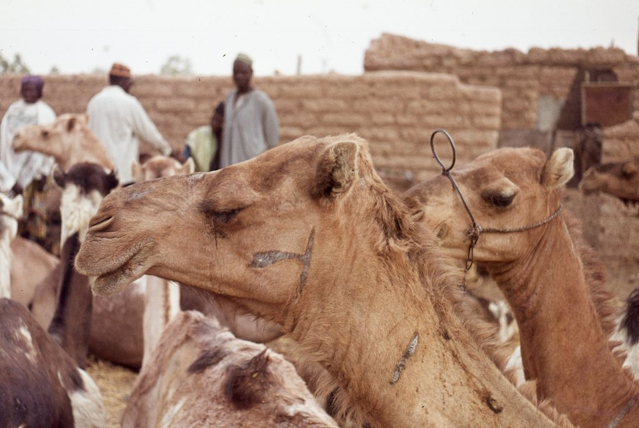AFRICAN ENCOUNTER
Overland Safari Blog
January – May 1973
Part Ten - Into Nigeria and out into Niger
The First Railway we had seen in days - Kano
Nigeria - We entered top right before Bama and left immediately north of Kano.
Where Nigeria sits in the African Continent , it is interesting to reflect how the borders of each country were defined.
April 12 1973
We left Cameroon, with some regret, after only four days - as it had been a rather uplifting encounter, and crossed the border into Nigeria. I imagine that we all thought that we knew something about Nigeria as it had been in the news for some long time. How wrong could we have been.
It seems that the area now known as Nigeria has a very long history. The oldest fossil remains found by archaeologists in the southwestern area of iwo Eleru, near Akure, have been dated to about 9000 BCE., but this was not a part of Nigeria that we would be seeing, indeed our journey simply crossed a part of the north of the country, and we would see nothing of the better known parts of the counry which tended to be in the south with the port of Lagos as its center (and had always sounded. to me. hot and steamy).
April 2, 1972 was a key date in Nigeria's recent history. Nigerians had been driving with British imported right-hand-drive cars on the left side of the road, but after the civil war, it changed to using left-hand drive cars on April 2, 1972.
Why did the Nigerian government, under the leadership of Major-General Yakubu Gowon, part ways with the British system Right-Hand driving to the Left-Hand Drive? The following reasons have been given:
- First, the entire West African region is dominated by the Francophone countries (countries colonized by France) and the need for a seamless transportation and business flow triggered the change.
- Second, most cheap and affordable cars in vogue then were made in France (Renault, Peugeot) and Germany (Volkswagen) which were designed for right-hand drive roads. It would be an expensive process to convert them. Though Japanese cars are built for left-hand drive roads, they were not popular in Nigeria in the ‘70s.
- Third, more countries now use on the left-hand drive side than the right. Most of whom are giant automobile manufacturers.
OK so there were good reasons for the change, but ...... the short-term effects were clearly rather dramatic as we passed many wrecks on the side of the road. I recall that there is an adage that says "This is Africa" which covers a mulititude of sins - in this case it was if there had been an accident just leave it where it happens - the same seemed to apply on the railways - I recall seeing a huge Beyer-Garratt loco on its side, next to the line from JHB to Mafeking - it had clearly derailed on a curve on the track; What a sad sight it made.
Of course, one of the things we experienced in Nigeria was that the Roads were tarred and sealed, and probaby as a result of which there were motor cars to be avoided - not many, but just enough to make sure we were always on the correct, right, side of the road.
14 April 1973
My Dagboekie records that the first places that we encountered were small towns Bama, Maiduguri, Damatura and Potiskum. In the latter place I had a rather disturbing experience; I had not been prepared for Ju Ju, nor indeed to come upon it at close quarters. It all started when we had stopped near what was probably an hotel. As i walked towards it I bcame aware of the strange sounds of instruments and voices raised in a sort of chanting which came from the back of the hotel. Not to be denied an enounter with local customs and traditions I ventured to where the sounds came.
There was a strange sight in front of me; a smallish crowd had gathered at the back of the Hotel under an awning and to the accompaniment of a tune less stringed instrument what appeared, to my novices eye, a sort of exorsism was taking place. There was much shouting and there appeared to be one particular character leading the proceedings, who was decidedly agressive in his actions. I stayed and watched for a little time and even considered taking a photo, but discretion took hold and said DON'T. At that time I knew very little about spirits and demonic forces, apart from what I had read in Denis Wheatley novels so to see this going on, in public, unregulated, was something of a shock. I didn't stay very long but left the place somewhat confused but glad to return to the comparative safety of the Truck - whew! (I think that I might have recorded some of the ceremony so may be able to include it on a Blog of Sounds that i should be able to make after the journey has ended - now that I have been given some guidance on how to convert my Cassettes to MP3 - if I am able to make the conversion it will be something of a feat for someone who is definitley not techno gifted).
My Dagboekie tells me that we camped that night "on the right, in an open field" and I suspect to my relief away from the Potiskum and its Witch Doctors.
The following day we arrived in Kano, which was the second largest City in Nigeria, and probably one of the largest that we encountered anywhere on our journey. It was here that we spent 3 days, and each night we set a watch of two of us for two hours each. Fortunately, none of us were called upon to take any action to defend the camp which was only just on the edge of the Ciy. At Kano we made preparations for the next stage of the journey which would be through some rather hot and inhospitable country, this included stocking-up on tinned food and also giving the Truck something of a clean, as it was looking rather tired.
One of the Markets in Kano - you will see that the produce on sale, included the dellghts of Ovaltine and Bournevita as well as Soap, Semolina and Toilet Papers - all in one very colourful stall - and with a rather colourful customer.
A view of the New Market - note the Islamic costumes worn by the Stallholders, look hard and you may see Umbrellas for sale
My Dagboekie records that we left kano at about 9.00m and entered Niger - my mind is a blank on quite why we left so late, and it also records that we had Dinner out, one of the few times when the Kitty enabled us to do so - but who knows wht we ate - perhaps it was Camel Steaks!?
The first Town across the border was Zinder. At Zinder we encountered our first
camels which were arriving into town in their Trains, managed by their Toureg
drivers. It also became apparent at Zinder that water had become a precious
commodity, as well as the means to keep and carry it, and we duly stocked
up the cans which hung on the side of the truck.
The Next Part - should include a Football "Game", and our entry into a rather unwelcoming Algeria














Comments
Post a Comment